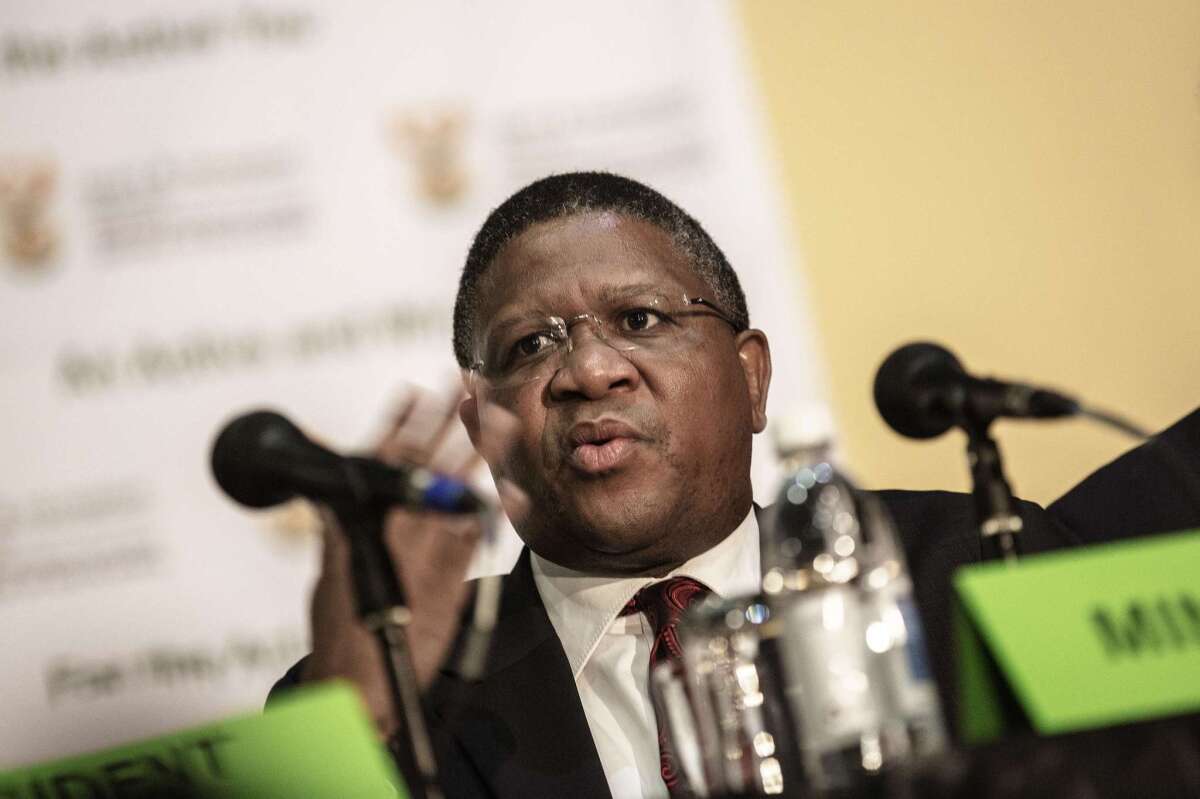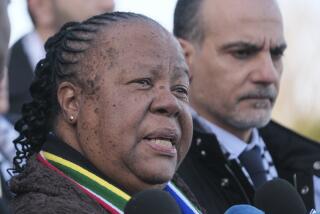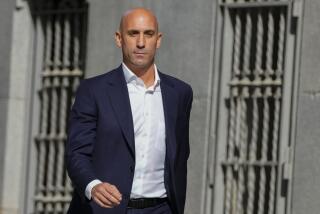South Africa denies $10-million bribe to secure 2010 FIFA World Cup

South African sports minister Fikile Mbalula denied any wrongdoing over allegations that huge bribes were paid during the process to select the host country for the 2010 World Cup.
South African Sports Minister Fikile Mbalula on Thursday vehemently denied allegations that South Africa bribed FIFA officials with $10 million to secure soccer’s World Cup in 2010, and accused the United States of going “beyond its borders” by indicting 14 people, including FIFA officials, on corruption charges.
Meanwhile, one of the top South African officials involved in the bid, Danny Jordaan, head of the South African Football Assn., was on Thursday sworn in as mayor of the coastal town of Port Elizabeth. He made no comment about the allegations of corruption.
The decision to award the World Cup to South Africa was one of the nation’s recent defining moments -- and when it won the right to host the event in 2004, many attributed the move to the personal charm of its first black president, Nelson Mandela, who pressed for South Africa to be given the opportunity. It was the first time the World Cup was held in Africa, uniting the continent in pride.
But U.S. Atty. Gen. Loretta Lynch told a news conference Wednesday that the process was tainted by corruption.
“Around 2004, bidding began for the opportunity to host the 2010 World Cup, which was ultimately awarded to South Africa, the first time the tournament would be held on the African continent. But even for this historic event, FIFA executives and others corrupted the process by using bribes to influence the hosting decision,” she said.
Nine FIFA officials and five corporate executives were indicted Wednesday on racketeering, conspiracy, money laundering and corruption charges in connection with the case.
The U.S. indictment describes co-conspirators Nos. 15 and 16 as high-ranking officials of South Africa’s 2006 and 2010 World Cup bid committees, without naming them. In South Africa, the indictment has ignited a clamor for top officials to be investigated, including Jordaan.
But Mbalula told a news conference Thursday that the government was “very clear in our conscience as South Africa on this matter.”
“We’re very clear that there’s nothing that we do that was unlawful with respect to the 2010 World Cup.
“We didn’t run a spaza shop or picnic,” he said, referring to a small shop in a South African township. “We ran a proper process. We’re clear we’ve not done anything untoward.”
Mbalula said South Africa would protect its “sovereignty” in connection with the accusations of corruption in the FIFA process to award the World Cup.
“We’ve got nothing to hide as a nation and as a government,” he said. “As a nation we will be the first to endorse the fight against corruption wherever it is found.”
He said the Department of Sport and Recreation’s accounts had been audited and that no bribe had been paid.
“We will study carefully the copy of the [indictment] once received from the U.S. government through the diplomatic channels and we will pronounce further after carefully studying it,” Mbalula said in a statement.
Some critics questioned the haste with which Mbalula dismissed the detailed allegations in the U.S. indictment. On page 80 of the 162-page indictment, it is alleged that then-FIFA official Jack Warner cultivated ties with South African sports officials after the country’s unsuccessful 2006 bid to host the World Cup.
A South African official met a member of Warner’s family in a Paris hotel room and handed him a briefcase containing bundles of $10,000 bills, according to the indictment. The family member immediately flew back Warner’s home of Trinidad and Tobago and handed the briefcase to him, according to the indictment.
As South Africa and Morocco faced off for the right to host the 2010 World Cup, Moroccan officials offered Warner a $1-million bribe in exchange for his promise to vote for Morocco in the executive committee secret ballot to decide who would get the event, the indictment said.
According to the indictment, high-ranking South African government officials and members of the country’s bid committee were willing to pay a $10-million bribe in order to secure the votes of Warner and two others on the executive committee. The payment was to be disguised as money “to support the African diaspora,” the indictment said.
In May 2004, South Africa was named the successful bidder in a ceremony attended by Mandela.
It later turned out that South Africa was unable to make the payment directly from government funds, the indictment said. Instead, the money was taken from FIFA funds that were transferred to South Africa to support the World Cup, according to the indictment.
In his news conference Thursday, Mbalula insisted that no payment was made from the South African government to FIFA officials. However, the allegation is that the money was subtracted from FIFA’s payments to South Africa.
South Africa’s opposition Democratic Alliance called Thursday for an investigation and demanded that Jordaan, head of the football association, appear before parliament’s committee on sports to explain what happened.
“As the CEO of the bid committee, Danny Jordaan oversaw the 2010 bid strategy. His role in these allegations must be probed,” said Solly Malatsi of the Democratic Alliance. “A transaction of the magnitude of $10 million would not have happened without the knowledge of the most senior figures leading the country’s bid for the World Cup,” he said.
“It is a national shame that one of the proudest moments for our democratic nation has been tarnished by this latest scandal,” he said.
More to Read
Start your day right
Sign up for Essential California for news, features and recommendations from the L.A. Times and beyond in your inbox six days a week.
You may occasionally receive promotional content from the Los Angeles Times.






